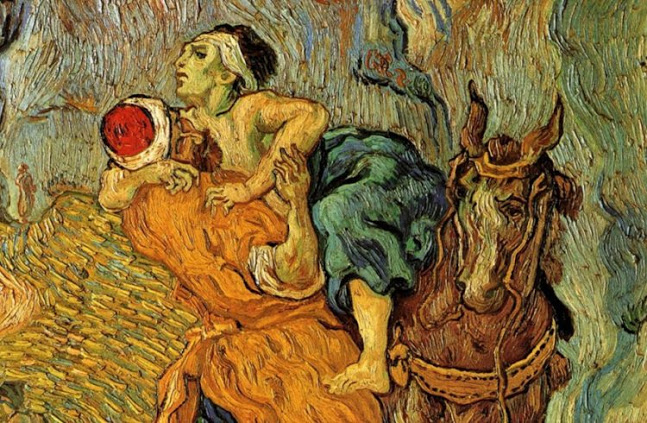From Luke 10-11
 God commands his people to love their neighbour as they love themselves. Who is your neighbour? Are there people you would rather not love? Who are the people whom you consider least likely to obey this command? In today’s passage Jesus tells the parable of the good Samaritan.
God commands his people to love their neighbour as they love themselves. Who is your neighbour? Are there people you would rather not love? Who are the people whom you consider least likely to obey this command? In today’s passage Jesus tells the parable of the good Samaritan.
This post is part of my bible in a year series.
Passage and Comments
At a number of times Jesus is put to the test by the religious authorities. They want to tear him down, but Jesus has a remarkable ability to turn things around on them.
[25] And behold, a lawyer stood up to put him [Jesus] to the test, saying, “Teacher, what shall I do to inherit eternal life?” (Lk 10:25)
In this case Jesus is tested by a ‘lawyer’. The law of the lawyer is the law of Moses. While Jesus is not in court as such, he is being tested. His theology is being checked.
The lawyer asks him a question which is asked by the rich man at another time (e.g. My 19.16-19).
‘What shall I do to inherit eternal life?’
This is a very important question for protestants who may want to make a sharp distinction between ‘doing’ and ‘believing’.
‘Inherit’. The concept of inheritance extends all the way back to when Israel first came into the promised land. The twelve tribes inherited the promised land. It because their possession. Here the lawyer believes that in some way people can inherit eternal life. Eternal life with God when his kingdom comes.
Jesus’ answer may surprise some.
[26] He said to him, “What is written in the Law? How do you read it?”
[27] And he answered, “You shall love the Lord your God with all your heart and with all your soul and with all your strength and with all your mind, and
your neighbor as yourself.” (Lk 10:26-27)
Jesus answers his question pointing him to the law of Moses.
‘All’, ‘heart’, ‘soul’, ‘strength’, ‘mind’. The command to love God encompasses every part of our being which is divided into ‘heart’, ‘soul’, ‘strength’ and ‘mind’. The command highlights nothing is to be held back in reserve. God is to be given top priority in our lives as the one we ought to love.
(Note: When we consider descriptions of God’s future judgment, receiving eternal life is also described in Rom 2.6-11; 8.13; Gal 6.7-10. Like these Luke is indicating that Jesus will judge people on the trajectory of their life’s decisions and actions (‘render according to works’), not on a perfect sinless standard (cf. Mt 13.37-43; 25.31-46). So what we come back to is will we trust Jesus in that loving God and our neighbour is a necessary part in how we receive eternal life.)
The lawyer has meditated on the law enough (‘how do you read it?’) or perhaps knows what Jesus has said before to know the two greatest commandments in the law (Mk 12.28-34).
[28] And he said to him, “You have answered correctly; do this, and you will live.” (Lk 10:28)
Basically Jesus and the lawyer are affirming the way to inherit eternal life is to keep these two greatest commands of the law of Moses.These commands are not exclusive, but ought to be held together with trust in God’s promises and dependence on his mercy and forgiveness.
How do you respond to what Jesus says? Do you trust him that loving God and our neighbour is important for inheriting eternal life?
The lawyer wants to push further. Previously he was testing Jesus. Would Jesus affirm the law of Moses? In this instance Jesus does. Now the lawyer feels tested himself. Is he keeping these commands? He thinks he is, so he asks another question.
[29] But he, desiring to justify himself, said to Jesus, “And who is my neighbor?” (Lk 10.29)
The lawyer asks the question to clarify who he should love and who he does not have to.
He is trying to ‘justify’ himself. Using the word in the sense that he will be seen to be righteous, identified as righteous. Not in the sense where he a sinner, becomes righteous.
Who do you think you are commanded to love? Who does God love?
In practice, I’m sure there are people whom he considers it okay not to love, because he doesn’t consider them his neighbor. He wants Jesus to affirm he is righteous even though he doesn’t love these people.
Jesus replies with a Parable. A short story illustrating his point. The story puts the theory into practice.
[30] Jesus replied, “A man was going down from Jerusalem to Jericho, and he fell among robbers, who stripped him and beat him and departed, leaving him half dead.
[31] Now by chance a priest was going down that road, and when he saw him he passed by on the other side.
[32] So likewise a Levite, when he came to the place and saw him, passed by on the other side. (Lk 10.30-32)
Its likely the robbed, half dead man, having come from Jerusalem is a Jew. The text doesn’t say. But the silence suggests there was nothing unusual about him, which I think makes this assessment more likely. Otherwise Jesus would have highlighted it.
Jesus calls into question the reactions of three men who by chance – they were not going out of their way to find people in distress – to see the robbed, half dead man. A priest, a levite and a Samaritan.
Priests were obviously involved in temple worship. They knew the law backwards, sacrificed and prayed to the LORD all day. He sees the robbed, half dead man and avoids him.
The Levite was of the priestly tribe, but not a priest. He may not have been directly involved in the temple as the priest was. They were used in support work. But he certainly would have been acquainted with the law and how God wanted him to live. He sees the robbed, half dead man and avoids him.
The lawyer would probably have a high opinion of people like these.
Perhaps they avoided the man because they thought he was dead and would make them unclean? They do react to the man by avoiding him. Perhaps they couldn’t care less and didn’t want to feel as much shame, looking upon the man in distress and then walking by.
[33] But a Samaritan, as he journeyed, came to where he was, and when he saw him, he had compassion. [34] He went to him and bound up his wounds, pouring on oil and wine. Then he set him on his own animal and brought him to an inn and took care of him. [35] And the next day he took out two denarii and gave them to the innkeeper, saying, ‘Take care of him, and whatever more you spend, I will repay you when I come back.’ (Lk 10:33-35)
The Samaritan comes by and has compassion on the robbed, half dead man.
Samaritans (e.g. Jn 4) were Israelites who had mixed bloodlines with the Samaritans after they were conquered by Assyria more than 500 years ago. They were looked down upon by the Jews (Judeans) who considered themselves pure in terms of their bloodlines.
Its not likely the lawyer would highly regard the Samaritan.
The Samaritan stops. He gives up his oil and wine to treat him. He puts the robbed, half dead man on his own animal (being half dead he cannot walk) and journeys all night taking him to an inn. There he gives the innkeeper two days wages and promises to come back paying him any excess. We should assume he would have done just that.
[36] Which of these three, do you think, proved to be a neighbor to the man who fell among the robbers?” (Lk 10.36)
So Jesus puts the lawyer in the position where he has to decide on who is righteous in obeying the command to love their neighbor.
Normally he would favor the priest and the levite. He would scorn the Samaritan. But here it is, the most unlikely person – the Samaritan – is the one who keeps the law. And I think the Samaritan is helping a Jew. Helping a person who would normally treat him poorly.
The most unlikely person is doing the right thing.
[37] He said, “The one who showed him mercy.” And Jesus said to him, “You go, and do likewise.” (Lk 10:37)
The lawyer is forced by Jesus’ parable to favor the Samaritan over the priest and the levite. To favor his actions in caring for his Jewish neighbor above the duties associated with the temple and its worship. The lawyer is encouraged to become like the Samaritan.
About Jesus
There are a few things in this parable which highlight what Jesus thinks is important.
At the start Jesus affirms the importance of loving God and neighbor in how one inherits eternal life.
In the parable, Jesus implicitly contrasts the temple duties of the priest and Levite with the ‘love’ of the Samaritan. He thinks showing mercy and helping the needy is important by far. Don’t let religious activities replace good works for those who need it.
He puts the lawyer in the position where he has to consider the most unlikely person as righteous and obedient. This is an advance foretaste of Gentiles believing in Jesus and being part of God’s family. They too will have the obedience of faith.
Copyright © Joshua Washington and thescripturesays, 2015. All Rights Reserved.


